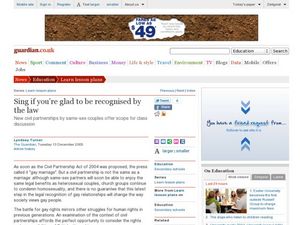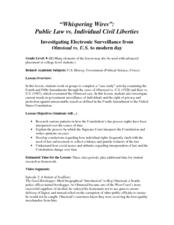PBS
The Supreme Court: Early Civil Rights Cases Facing the Supreme Court
Imagine being an ex-slave after the Civil War and not understanding if you were considered a citizen of the United States. Scholars analyze the early Supreme Court battles in civil rights cases and especially the Fourteenth Amendment....
School Improvement in Maryland
Court Proceedings Civil Cases
What's the difference between civil and criminal law? How do the court proceedings differ in these two types of trials? How do the standards of proof differ? Why do these differences exist? As part of their examination of the US court...
Judicial Learning Center
Types of Court Cases
How can one court acquit someone of a crime, while another convicts the person of the same one? It's all because of the differences between civil and criminal trials. An informative resource provides scholars in the field of criminology...
Judicial Learning Center
Why Study Landmark Cases?
Why study landmark Supreme court cases? A helpful lesson offers a brief but valuable argument for the importance of these cases in the field of criminology. It introduces scholars to some key terms necessary for studying court cases and...
Personal Genetics Education Project
DNA, Crime and Law Enforcement
Civil rights meets biotechnology in a instructional activity that scrutinizes the collection of DNA of citizens who have been arrested, but not yet convicted of a crime. Real-life cases are examined in which the DNA of a relative was...
Judicial Learning Center
Civil Rights and Equal Protection
Almost every American is familiar with the Supreme Court case of Brown vs. Board of Education. Far fewer understand the constitutional reasoning or the wide-ranging consequences of the ruling in the field of criminology. The interesting...
Judicial Learning Center
Understanding the Types of Cases
Most young scholars are aware of the criminal courts system, but the United States Constitution allows for a much broader role. What other roles do courts play in settling other questions? A case study and WebQuest-style activities...
Curated OER
Background to the Conflict: Pre-Civil War Days
The American Civil War was a complex test of a relatively young democracy in the mid-nineteenth century. Discuss the events and factors that led to the Civil War with a thorough slideshow presentation.
Curated OER
Lesson 4: The Judiciary: A Brief Introduction to the Courts System
Focusing on the judicial branch of government, the fourth lesson in this series explores the structure of the US courts system. Beginning with an engaging activity based on the short story The Lady or the Tiger, students go on to examine...
American Institute of Physics
Physicist Activist: Dr. Elmer Imes and the Civil Rights Case of Juliette Derricotte
Elmer Imes was not only a brilliant physicist but also a civil rights activist. After an introductory lecture, groups read two articles about a traffic accident that killed one Fisk University student and injured several others. The...
Curated OER
Sing if you're glad to be recognised by the law
Equal rights, state law, and Civil Partnerships is the topic of this class discussion. Upper graders hone their research skills to engage in an intelligent and well-supported discussion on the Civil Partnership Act of 2004. Provided are...
Curated OER
It's Your Right: A Civil Rights Brochure
Learners examine the US Constitution, Bill of Rights, and Supreme Court cases in order to broaden their understanding of the US Judicial System. They research a variety of textual and Internet resources to create a tri-fold brochure,...
Curated OER
Civil Rights Leader: Rosa Parks
All humans should have civil rights, but that wasn't the case in Alabama. This biographical presentation shares information about the life and inspiration that Rosa Parks brought to the Civil Rights movement. It explains her thoughts,...
Facing History and Ourselves
Taking Ownership of the Law
The work of building and maintaining a democracy is, in the words of Justice William Hastie, "never finished." To better understand what Hastie sees as an ongoing building process, class members listen to a seven-minute podcast about two...
iCivics
The Road to Civil Rights
Here is a fantastic resource on the civil rights movement! It includes reading materials and worksheets, and particularly highlights major legislation and the role of the judicial branch in the federal government in addressing the...
Curated OER
Law 12 - Law and Society
Law and society go hand-in-hand, explore the law as it pertains to social impact throughout history. Here are 20 excellent questions that have learners examine law from the code of Hammurabi, to Napoleonic law and the Magna Carta....
Facing History and Ourselves
Laws and the National Community
When it comes to the law, is justice always served? Teach scholars about how law sometimes enables prejudice of entire groups of people with a unit on World War II that includes a warm-up activity, analysis of primary sources,...
Civil Rights Movement Veterans
Timeline of Events: 1960’s Civil Rights Movement of St. Augustine, Florida
A timeline can be a powerful learning tool because it reveals a pattern in events. While few would consider St. Augustine, Florida a hotbed of the 1960s Civil Rights Movement, a selection of background information and a timeline of...
Alabama Department of Archives and History
New York Times Co. v Sullivan: The Alabama Case that Changed Libel Law
Malice aforethought? Can the New York Times be held libel for false claims appearing in its ads? The Supreme Court case New York Times v Sullivan changed the interpretation of the First Amendment. Class members examine these changes and...
School Improvement in Maryland
Supreme Court Case Overview I
As part of a study of the 14th Amendment to the United States Constitution, class members examine four Supreme Court decisions—Gitlow v. New York, Mapp v. Ohio, Gideon v. Wainwright, and Griswold v. Connecticut—that incorporated the due...
Curated OER
Should Homosexuals Have the Right to Laws Protecting Them From Discrimination?
Students explore discrimination issues in America. In this homosexual rights lesson, students listen to their instructor lecture on antidiscrimination laws and gay rights. Students respond to questions about the Romer v. Evans case.
Sharp School
The Bill of Rights and Supreme Court Cases Project
Social media and United States history combine as your young historians design a Facebook page for two major defendants of landmark Supreme Court cases. The resource includes a detailed rubric for research and page design, as well as a...
Judicial Learning Center
Levels of the Federal Courts
The Supreme Court gets all the glory, but very few federal cases make it to the highest court. An interesting lesson explores the structure of the lower levels of the federal court system. In addition to outlining the organization of...
Curated OER
"Whispering Wires": Public Law vs. Individual Civil Liberties
High school student love discussing controversial issues like those brought up in this fourth amendment case study. They examine the 1928 Olmstead vs. U.S. prohibition court case, applying the fourth amendment to determine whether or not...

























